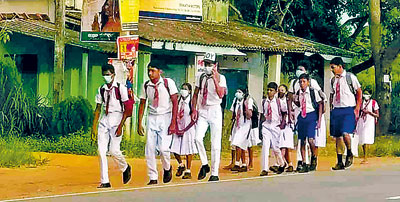News
Whether going to school or online learning, it’s a struggle all round
View(s):By Nadia Fazlulhaq
City school closures, commencing online education and conducting physical school in outstations did not mitigate the struggle teachers, parents and students faced this week as a result of the fuel crisis, power cuts and financial difficulties.
In villages, limited public transport and unavailability of fuel for bikes and three-wheelers affected teachers who travel several kilometres to their respective schools.

With less buses on the roads schoolchildren walk to school. Pix by Hiran Priyankara
“I used to take a bus and then spend about Rs. 300 for a three-wheeler trip to school,” said a teacher from Embilipitiya. “Now, even if I manage to take the bus, I end up standing for hours for a three-wheeler and paying about Rs. 500-800 for one trip.”
T. M. S. Karunasena, Principal of Sirisumana MV in Hingurugamuwa in Badulla district, said a majority of the 700 students in her school lived nearby. Therefore, attendance was as usual. However, they struggled with fewer teachers as they weren’t located close by. “Some were in fuel queues to get petrol for their bikes and many were unable to find alternative transport,” he said. “We told teachers, especially those teaching primary classes, to report to work for at least two days. Primary student attendance was high due to the mid-day meal provided at school.”
Piyasiri Fernando, a school Principal from Puttalam, said it’s difficult to continue academic activities with low teacher attendance. So several classes were combined and taught this week.
Ceylon Teachers Union General Secretary Joseph Stalin said some teachers were told to report during the day and to conduct online classes in the evening for students who were unable to attend.
“The Ministry wants to cover up the syllabuses and to maintain the school days,” he pointed out. “But there are many practical issues. Teachers and parents are worried over fuel and cost of living. With tax imposed, data expenditure is also high.”
“Some teachers end up paying over Rs.1000 daily to travel to school,” said the Ceylon Teacher Services Union’s Mahinda Jayasinghe. “In some schools, only one teacher is from nearby while all are residing several kilometres away. Online education is still not practical due to poor signals, exorbitant prices of mobile phones with video facilities and data costs.”
Children in cities and suburbs were rushing to the nearest communication centres in search of data cards. “Online lessons on Zoom and Microsoft Teams require a lot of data,” said Madusha Dilrukshi, a grade 11 student from Rajagiriya. “Compared to COVID period, online classes now require more data for classes.”
Power cuts were a burden to both students and teachers who found it difficult to conduct evening classes. Parents fear the ongoing fuel crisis will continue to haunt them even if schools reopen next week mainly due to transport concerns.
Parents also claimed that despite a week’s leave, many school transport services have charged for the whole month.
“School van charges gradually increased from Rs. 6000 to 8000 and Rs 10,000 per month,” said Anoushka, whose son travels from Moratuwa to Colombo to attend a private school. “Parents are struggling to pay term fees, increased food and other expenses.” Save the Children organisation this week said a needs assessment showed that 50 percent of families are struggling to support their children’s education and some are already dropping out of school.
“Parents are having to decide whether to buy data to access online classes, or use this money for food,” said Ranjan Weththasinghe, Save the Children’s Director of Programmes in Sri Lanka. “This economic crisis is making things worse. Not only are schools closing once again, but families have even less resources at their disposal to keep kids learning than they did before the pandemic.”
“The education of 4.8 million children hangs in the balance,” said UNICEF Country Representative Christian Skoog during the launch of the humanitarian action for children. “UNICEF’s teams on the ground have reported that school attendance has dramatically decreased, particularly in low-income areas. This is due to transport challenges for both teachers and children, power cuts, lack of stationery, among others.”
Education Minister Susil Premajayantha said the average teacher attendance was 67 percent this week while student attendance was 64 percent. The missed school days will be conducted by reducing the length of the August and December vacations. In July, primary and advanced level teachers will be provided with special training to cover up essential syllabus contents, he said.
The Education Ministry this week said considering requests of the teachers, arrangements have been made to give temporary service placements (effective only till December 31) to nearby schools with several conditions.
The best way to say that you found the home of your dreams is by finding it on Hitad.lk. We have listings for apartments for sale or rent in Sri Lanka, no matter what locale you're looking for! Whether you live in Colombo, Galle, Kandy, Matara, Jaffna and more - we've got them all!

